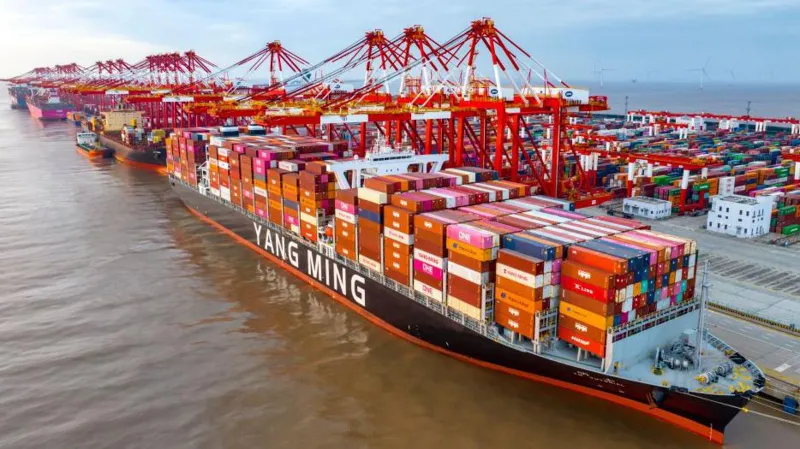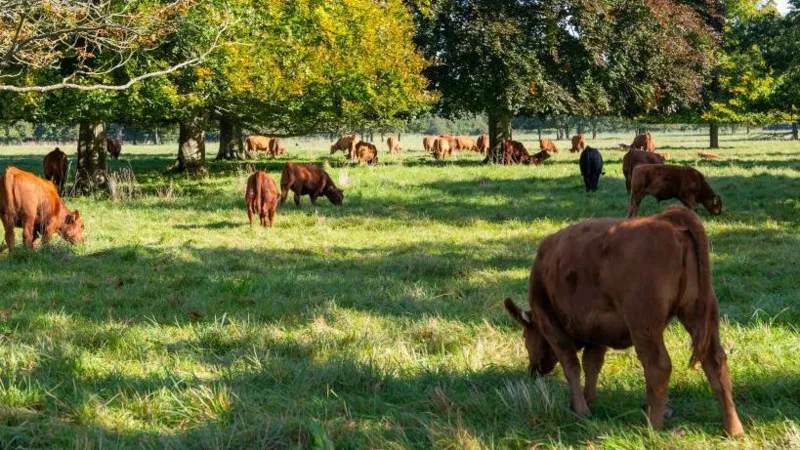Business
Trump 2.0′ looms large over the global economy

Inflation, interest rates and tariffs mean 2025 is shaping up to be an intriguing year for the global economy. One in which growth is expected to remain at a “stable yet underwhelming” 3.2%, according to the International Monetary Fund. So what might that mean for all of us?
Exactly a week before Christmas there was a welcome gift for millions of American borrowers – a third interest rate cut in a row.
However, stock markets fell sharply because the world’s most powerful central banker, US Federal Reserve chair Jerome Powell, made clear they shouldn’t expect as many further cuts in 2025 as they might have hoped for, as the battle against inflation continues.
“From here, it’s a new phase, and we’re going to be cautious about further cuts,” he said.
In recent years, the Covid pandemic and the war in Ukraine have led to sharp price rises around the world, and although prices are still increasing the pace has slowed markedly.
Despite that, November saw inflation push up in the US, eurozone and UK to to 2.7%, 2.2% and 2.6% respectively. It highlights the difficulties many central banks face in the so-called “last mile” of their battle against inflation. Their target is 2%, and it might be easier to achieve if economies are growing.
However, the biggest difficulty for global growth “is uncertainty, and the uncertainty is coming from what may come out of the US under Trump 2.0”, says Luis Oganes, who is head of global macro research at investment bank JP Morgan.
Since Donald Trump won November’s election he’s continued to threaten new tariffs against key US trading partners, China, Canada and Mexico.
“The US is going into a more isolationist policy stance, raising tariffs, trying to provide more effective protection to US manufacturing,” says Mr Oganes.
“And even though that is going to support US growth, at least in the short term, certainly it’s going to hurt many countries that rely on trade with the US.”
New tariffs “could be particularly devastating” for Mexico and Canada, but also be “harmful” to the US, according to Maurice Obstfeld, a former chief economist at the International Monetary Fund, and a previous economic advisor to President Obama.
He cites car manufacturing as an example of an industry that “depends on a supply chain that is spread across the three countries. If you disrupt that supply chain, you have massive disruptions in the auto market”.
That has the potential to push up prices, reduce demand for products, and hurt company profits, which could in turn drag down investment levels, he explains.
Mr Obstfeld, who is now with the Peterson Institute for International Economics, adds: “Introducing these types of tariffs into a world that is heavily dependent on trade could be harmful to growth, could throw the world into recession.”
The tariffs threats have also played a role in forcing the resignation of Canada’s Prime Minister Justin Trudeau.
Business
UK bans cattle, pigs and sheep imports from Germany after foot-and-mouth case

The UK has introduced a ban on pigs, sheep and cattle imports from Germany after a case of foot-and-mouth disease was confirmed in the country.
The government said on Tuesday it will no longer approve health certificates for animals, fresh meat and animal products susceptible to the disease to prevent its spread to the UK where there are currently no confirmed cases.
While there is no risk to humans or food safety, foot-and-mouth is highly contagious in pigs, sheep and cattle, as well as other cloven-hoofed animals.
In 2001 and 2007, the UK suffered major outbreaks of the disease, leading to millions of livestock animals being slaughtered across the country.
Farming minister Daniel Zeichner said the government will do “whatever it takes to protect our nation’s farmers from the risk posed by foot-and-mouth”.
He added: “That is why restrictions have immediately been brought in on animal products from Germany to prevent an outbreak, and we will not hesitate to add additional countries to the list if the disease spreads.
“We will continue to keep the situation under review, working closely with the German authorities.”
Foot-and-mouth disease is a legally notifiable disease, meaning it is an offence not to report a case to the government.
As well as culling animals, farmers affected by the disease could see reduced milk production, as well as wider economic implications such as the loss of access to foreign markets for animals and their subsequent products.
Major outbreaks in 2001 and 2007 cost the public and private sectors billions.
For cattle, symptoms of the disease include blisters and sores on their feet, mouth and tongue, as well as lameness, fever and reluctance to feed.
In sheep and pigs, symptoms typically present as lameness and blisters.
UK Chief Veterinary Officer Dr Christine Middlemiss has asked “livestock keepers to exercise the upmost vigilance for signs of disease, follow scrupulous biosecurity, and report any suspicion of disease immediately to the Animal and Plant Health Agency”.
The government recently announced a £200m investment in the UK’s main research and laboratory testing facilities at Weybridge to bolster protection against animal disease.
Business
Spain plans 100% tax for homes bought by non-EU residents

Spain is planning to impose a tax of up to 100% on the value of properties bought by non-residents from countries outside the EU, such as the UK.
Announcing the move, Prime Minister Pedro Sánchez said the “unprecedented” measure was necessary to meet the country’s housing emergency.
“The West faces a decisive challenge: To not become a society divided into two classes, the rich landlords and poor tenants,” he said.
Non-EU residents bought 27,000 properties in Spain in 2023, he told an economic forum in Madrid, “not to live in” but “to make money from them”.
“Which, in the context of shortage that we are in, [we] obviously cannot allow,” he added.
The move was designed to prioritise available homes for residents, the Spanish prime minister said.
Sánchez did not provide any more details on how the tax would work nor a timeline for presenting it to parliament for approval, where he has often struggled to gather sufficient votes to pass legislation.
His office described the proposed measure as a way to limit the purchase of homes by “non-resident non-EU foreigners”. In Spain, people are classed as non-residents if they live in the country for less than 183 days in a single year.
It added: “The tax burden that they will have to pay in case of purchase will be increased up to 100% of the value of the property, in line with countries such as Denmark and Canada.”
Currently non-residents can be expected to pay 6-10% in tax on the property’s value depending on the region and if the property is new or not.
The Spanish government said the proposal would be finalised “after careful study”.
Business
TikTok users flock to Chinese app RedNote as US ban looms

TikTok users in the US are migrating to a Chinese app called RedNote with the threat of a ban just days away.
The move by users who call themselves “TikTok refugees” has made RedNote the most downloaded app on Apple’s US App Store on Monday.
RedNote is a TikTok competitor popular with young people in China, Taiwan and other Mandarin-speaking populations.
It has about 300 million monthly users and looks like a combination of TikTok and Instagram. It allows users, mostly young urban women, to exchange lifestyle tips from dating to fashion.
Supreme Court justices are due to rule on a law that set a 19 January deadline for TikTok to either sell its US operations or face a ban in the country.
TikTok has repeatedly said that it will not sell its US business and its lawyers have warned that a ban will violate free speech protections for the platform’s 170 million users in the US.
-

 Entertainment5 months ago
Entertainment5 months agoEarthquake scientists are learning warning signs of ‘The Big One.’ When should they tell the public?
-

 International5 months ago
International5 months agoTarar accuses Imran Khan of conspiring with Faiz Hameed to destabilise Pakistan
-

 International3 months ago
International3 months agoPTI Announces Not to Boycott New Committees
-

 Business4 months ago
Business4 months agoMajor Corruption Scandal Uncovered at WASA Multan: Rs1.5 Billion Embezzlement Exposed
-

 Business5 months ago
Business5 months agoThe Impact of QR Codes on Traditional Advertising
-

 Business3 months ago
Business3 months agoHigh Court Blocks MDCAT Merit List Amid Controversy Over Exam Error
-

 Business5 months ago
Business5 months agoThe Benefits and Problems of International Trade in the Context of Global Crisis
-

 Business4 months ago
Business4 months agoFraud by Pakistani Firm Sparks Outrage in Business Community; Concerns Rise Over International Investment






